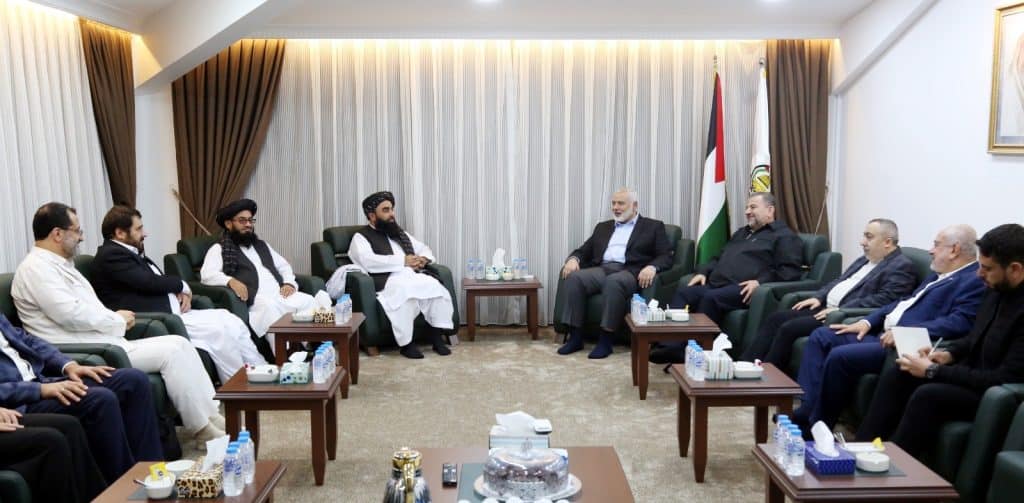
Last month, Taliban spokesman Zabihulla Mujahid and a delegation of Islamic Emirate of Afghanistan officials visited Turkey and met with various foreign officials including senior members of Hamas. The Taliban’s meeting with Hamas and other foreign officials is likely an attempt to curry favor with Turkey’s allies in a bid to persuade Ankara to establish full diplomatic ties with Taliban-ruled Afghanistan.
According to a Taliban statement, the purpose of the visit was to attract “investment, aid, and economic mobility” for Afghanistan.
During the visit, Mujahid attended a conference of Islamic scholars where he lauded Turkey as a “close friend” and asked the participants who hailed from various Middle Eastern countries to “make efforts to ensure the official recognition of the Islamic Emirate of Afghanistan by other Muslim countries.”
Mujahid also met with Hamas leader Ismail Haniyeh and other representatives of the Gaza-based terrorist organization.
According to a Hamas statement, the two sides discussed “several regional issues” including developments in Jerusalem and the West Bank. The statement also noted how both sides “stressed” the need to further bilateral relations including uniting the Ummah (Muslim community) “alongside the cause of Palestine.”
Hamas has previously expressed support for the Taliban. After the departure of U.S. Forces from Afghanistan in 2021, Ismail Haniyeh phoned Taliban leader Abdul Ghani Baradar, who now serves as Afghanistan’s first deputy prime minister, and congratulated him on the end of the U.S. “occupation,” saying it was “a prelude to the demise of all occupation forces, foremost of which is the Israeli occupation of Palestine.”
While Turkey has not officially recognized the Taliban, the meeting with Hamas in Istanbul should not come as a surprise. Hamas’ activity in Turkey has been extensive, including fundraising and military efforts.
In May 2022, the U.S. Treasury Department designated Hamas leader Hisham Younis Yahya Qafisheh for his “role in transferring funds on behalf of various companies linked to Hamas’s investment portfolio.” Some of these companies, such as Trendy GYO were based in Turkey. [See FDD’s Long War Journal report, U.S. Treasury Targets Hamas Financial Network.]
An al-Arabiya article citing The Times reported Hamas established cyber-warfare and counterintelligence operations in Istanbul. These units were largely aimed at targeting foes such as Israel, Saudi Arabia and the United States.
The Taliban’s attempt to increase ties to Hamas is not a surprise, as the group has long expressed support for Palestinian causes in the past while also explicitly stating that it would not establish diplomatic ties with Israel.
The Taliban has strong ties to other global and regional terror groups, including Al Qaeda, whose previous emir Ayman al Zawahiri was killed in an airstrike in Kabul in July 2022. The Taliban is also linked to the Movement of the Taliban in Pakistan, a host of Pakistani terror groups including Lashkar-e-Taiba, Harakat-ul-Mujahideen, Jaish-e-Mohammad, the Tajikistan-based Ansarullah, and the Islamic Movement of Uzbekistan. All of these groups maintain a presence in Afghanistan, despite Taliban assurances that it will not permit terror group to operate within Afghanistan.
Additionally, it is often difficult to distinquish between Taliban and Al Qaeda’s leadership. For instance, Sirajuddin Haqqani, one of the Taliban’s two deputy emirs and its interior minister, is known to serve as a member of Al Qaeda’s executive council, or shura. Sirajuddin and a host of Haqqani Network leaders have been listed by the U.S. as Specially Designated Global terrorists for their ties to Al Qaeda. And a number of “dual hatted” Al Qaeda/Taliban commanders were targeted by the U.S. military during the 20-year presence in Afghanistan.
Following the trip to Turkey, Mujahid expressed “hope” that the visit would produce aid and investment in Afghanistan.







